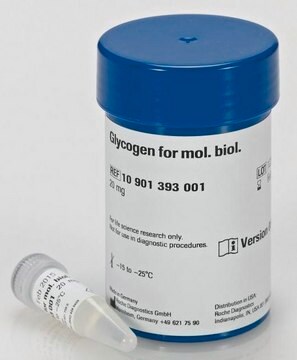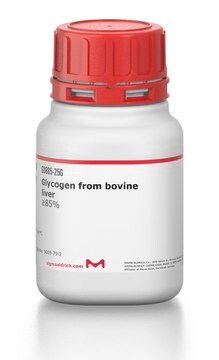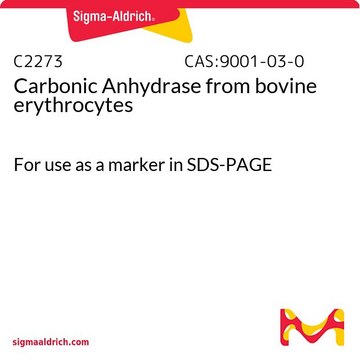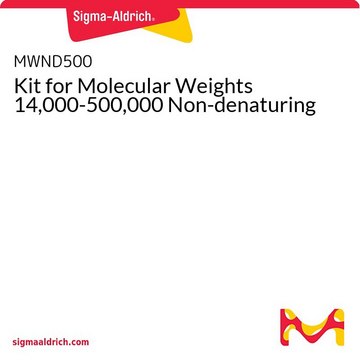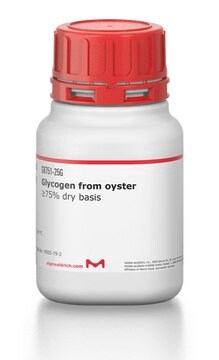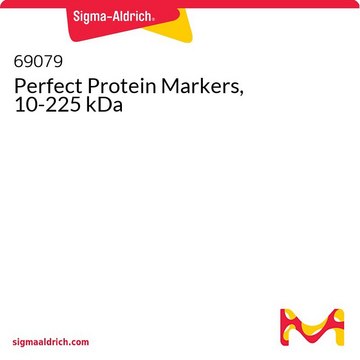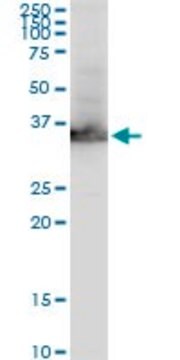G5262
GAPDH
standard for protein electrophoresis
Synonym(s):
Glyceraldehyde-3-phosphate Dehydrogenase from rabbit muscle, D-Glyceraldehyde 3-phosphate:NAD+ oxidoreductase (phosphorylating), GAPDH
Sign Into View Organizational & Contract Pricing
All Photos(1)
About This Item
Recommended Products
grade
for molecular biology
Quality Level
form
powder
mol wt
~36 kDa
packaging
vial of 5 mg
technique(s)
electrophoresis: suitable
storage temp.
2-8°C
Looking for similar products? Visit Product Comparison Guide
Related Categories
General description
GAPDH (Glyceraldehyde-3-phosphate dehydrogenase) catalyzes the conversion of glyceraldehyde-3-phosphate into D-glycerate-1,3-bisphosphate as part of the glycolysis pathway. GAPDH has also been found to function in additional cellular process, such as transcription, apoptosis, oxidative stress and ER to Golgi transport.
Application
GAPDH protein is suitable for use as a molecular weight marker and protein standard for molecular biology applications, including western blotting and mass spectometry.
Biochem/physiol Actions
Glyceraldehyde-3-phosphate dehydrogenase catalyzes the conversion of glyceraldehyde-3-phosphate into D-glycerate-1,3-bisphosphate as part of the glycolysis pathway.
related product
Product No.
Description
Pricing
Storage Class Code
11 - Combustible Solids
WGK
WGK 3
Flash Point(F)
Not applicable
Flash Point(C)
Not applicable
Personal Protective Equipment
dust mask type N95 (US), Eyeshields, Gloves
Choose from one of the most recent versions:
Already Own This Product?
Find documentation for the products that you have recently purchased in the Document Library.
Customers Also Viewed
Ling Ji et al.
Molecular therapy. Nucleic acids, 19, 546-561 (2020-01-14)
Long non-coding RNAs (lncRNAs) are crucial molecules in tumorigenesis and tumor growth in various human cancers, including colorectal cancer (CRC). Studies have revealed that lncRNAs can regulate cellular processes in cancers by interacting with proteins, for example RNA-binding proteins (RBPs).
Wen-Wei Zhang et al.
Eukaryotic cell, 12(1), 70-77 (2012-11-06)
The initial 7 steps of the glycolytic pathway from glucose to 3-phosphoglycerate are localized in the glycosomes in Leishmania, including step 6, catalyzed by the enzyme glyceraldehyde-3-phosphate dehydrogenase (GAPDH). In L. donovani and L. mexicana, there exists a second GAPDH
Kati Juuti-Uusitalo et al.
Investigative ophthalmology & visual science, 54(5), 3510-3519 (2013-05-21)
Aquaporins (AQPs), a family of transmembrane water channel proteins, are essential for allowing passive water transport through retinal pigmented epithelial (RPE) cells. Even though human native RPE cells and immortalized human RPEs have been shown to express AQPs, the expression
S A Ismail et al.
Acta crystallographica. Section D, Biological crystallography, 61(Pt 11), 1508-1513 (2005-10-22)
The crystal structure of human liver glyceraldehyde-3-phosphate dehydrogenase (GAPDH) has been determined. This structure represents the first moderate-resolution (2.5 A) and crystallographically refined (Rfree = 22.9%) human GAPDH structure. The liver GAPDH structure consists of a homotetramer, each subunit of
J E Welch et al.
Journal of andrology, 21(2), 328-338 (2000-03-14)
Although the process of glycolysis is highly conserved in eukaryotes, several glycolytic enzymes have unique structural or functional features in spermatogenic cells. We previously identified and characterized the mouse complementary DNA (cDNA) and a gene for 1 of these enzymes
Our team of scientists has experience in all areas of research including Life Science, Material Science, Chemical Synthesis, Chromatography, Analytical and many others.
Contact Technical Service
